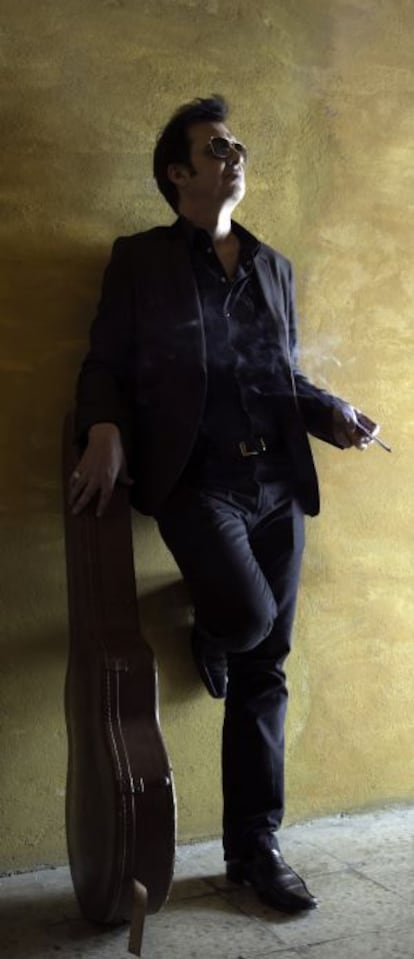The Spanish Sugar Man
Former star Fernando García discovered that remixes of one of his songs were huge hits


Throughout the 1980s, Jerez-based musician Fernando García Sánchez and his flamenco-influenced rock band Rey de Copas steadily built up a local following, and in 1987 signed a four-album deal with independent label Dro, today owned by Warner.
Then, one morning in February 1988, García’s son was badly injured when he fell from his school bus – García saw the accident from a distance, unaware who the child was. “We were recording our third album, and I just told the band that it was over for me,” he says. García left the music business, and dedicated the next decade to his son, taking him back and forth to hospitals and specialists in Barcelona.
By the early 2000s his son was able to walk again, and in the meantime, García had divorced, and after a failed business venture, was back giving music classes in Jerez. At the same time he continued composing and writing songs, and playing local gigs. Then, three years ago, he did a Google search and was astonished to find thousands of references to Frontera del ensueño (or, Frontier of dreams), a track from Rey de Copa’s second album that he had composed, and in 1990 had been remixed by Dave Ball, former partner of Marc Almond in 1980s British electronic pop duo Soft Cell, for his new outfit, The Grid. The song had become an international hit.
It’s a classic music biz story, similar to the one captured in 2012 Oscar-winning documentary Searching for Sugar Man, about 1960s US musician Sixto Rodríguez. Rodríguez had given up his career and was struggling to make ends meet, unaware he was a huge star in South Africa and Israel.
“Yeah, I’ve been told I should see it,” says García, who now faces a long legal battle to reclaim royalties on the myriad remixes of his song by house and chillout DJs over the last decade.
During the time he was out of the music business, at least 26 versions of ‘Frontera del ensueño’ were released
During the time he’s been out of the music business, at least 26 different versions of Frontera del ensueño have been recorded and released by around a dozen labels. In 2003, New York-based DJ Ray Roc had a hit with a black Latin soul version, while in 2009 an Australian label put out an album with 14 different versions, which sold in France, the UK, Japan, Belgium, Argentina, Australia, the United States, and dozens of other countries.
EL PAÍS calculates that around 756,000 albums and CDs of the song have been pressed, while it is difficult to know how many times it has been downloaded from iTunes, where it remains one of the popular songs on the site, according to Apple. Meanwhile, the SGAE, Spain’s leading copyright management organization, has collected just €10,000 on García’s behalf over the last 14 years.
The organization says it will be looking into sales and downloads of Frontera del ensueño over the coming weeks.
When EL PAÍS contacted the Madrid office of Warner, which continues to receive 50 percent of the royalties, and ended its contract with García in 1991, the company said the matter was the responsibility of its publishing division, Warner Chapell, which refused to answer any questions or return calls regarding the matter.
Rey de Copas’ ‘Frontera del ensueño.’
García says he traveled to Warner’s offices in Madrid last year. “I asked to see José Carlos Sánchez, the president, whom I knew from the old days, but he refused to meet me. I just want to know what is going on, but nobody at Warner is prepared to even talk to me,” he says.
In the meantime, García struggles to make ends meet by giving guitar classes. All that remains from the good old days is a battered Jaguar S-Type he cannot afford to repair. “I don’t need much to get by,” he says, pulling out the red Gibson semi-acoustic a friend bought him in 1980 that he has managed to hold on to.
García’s lawyer, Mónica Sevil, an expert in copyright law, says Warner’s stance leaves few options: “Either there has been illegal use of García’s work, which means the company has kept 100 percent of something that doesn’t belong to it; or in the event that the company has some rights in the matter, it has not released the 25 percent of the royalties that are Fernando’s by law.” She says that if Warner refuses to answer her questions, she will take legal action against the company.
García is philosophical about the whole affair, saying he has even learned to laugh about the quality of some of the versions of his song now they have made money for everybody except him: “There are some mixes that, well, it’s hard to know what to make of them. I guess I would have done them differently … but then they’re the ones that have been hits, not mine …”
The Grid’s remix of ‘Frontera del ensueño.’







































